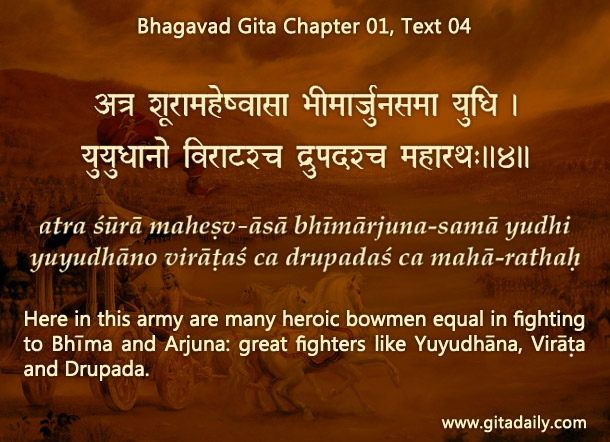How perception is an ethical act – We usually think of perception as a merely mechanical act; when some object comes within our visual range, we see it.
However, at every moment, many objects come into and go out of our visual range. Yet only some register in our consciousness; others don’t, even if they are present right in front of our eyes. What determines which objects we see or don’t see? Our ethics, that is, our internal system of valuation. We see the things that we value and neglect other things. A person with poor ethics will see a visit to a friend’s house as an opportunity to steal from that friend, not as an opportunity to further their friendship.. Thus, perception is itself an ethical act.
Ethics shape vision — this is demonstrated dramatically at the Bhagavad-gita’s start. When Duryodhana assesses the armies, he lists the prominent warriors on both sides. Yet he completely overlooks Krishna. Intriguingly enough, he mentions Arjuna (01.04) on whose chariot Krishna was seated. While seeing Arjuna, he would have seen Krishna. Yet that sight didn’t register within his consciousness. Why? Because he didn’t consider Krishna a noteworthy opponent. Before the war, Krishna had vowed to stay a non-combatant. Being in a fight, Duryodhana deemed valueless someone who wasn’t going to fight. In seeing only combatants, he forgot that there are many ways to fight other than just fighting.
Duryodhana’s oversight turned out to be especially costly because the non-combatant he overlooked was not an ordinary person or even an extraordinary person, but was the Supreme Person. Indeed, Duryodhana’s battlefield perception exposed his ethical blind spot.
By contemplating which objects we see and don’t see in various situations, we can better understand our ethical system.
One-sentence summary:
Perception is not just a mechanical act; it is also an ethical act — what we view reflects what we value.
Think it over:
- How is perception an ethical act?
- How are Duryodhana’s ethics revealed at the Gita’s start?
- Contemplate a situation where what you saw differed dramatically from what an acquaintance saw. What do such differences tell about your and their values?
***
01.04: Here in this army are many heroic bowmen equal in fighting to Bhima and Arjuna: great fighters like Yuyudhana, Viraṭa and Drupada.
To know more about this verse, please click on the image
Explanation of article:

Podcast:


Leave A Comment